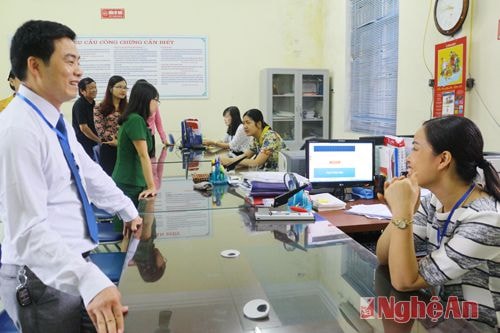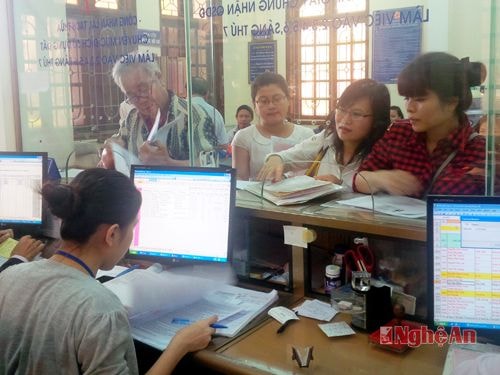Overcoming difficulties in notarization and certification transfer
(Baonghean.vn)- Voters in some localities proposed: The transfer of notarization and certification from the People's Committee of the commune to notary organizations is still causing difficulties. We request that the relevant agencies have solutions to overcome this.
The competent authority responded to this issue as follows:
The policy of separating notarization and certification work according to Resolution No. 49-NQ/TW dated June 2, 2005 of the Politburo on judicial reform strategy has been institutionalized in legal documents regulating the transfer of authority to certify contracts and transactions from the People's Committees at district and commune levels to notary organizations: Notarization Law 2006, Decree No. 79/2007/ND-CP dated May 18, 2007 on issuing copies from original books, certifying copies from originals, certifying signatures, Circular No. 03/2008/TT-BTP dated August 25, 2008 guiding the implementation of Decree No. 79/2007/ND-CP and Decree No. 88/2009/ND-CP dated October 19, 2009 on granting certificates of land use rights, house ownership rights and other assets attached to land. land.
 |
| The monitoring delegation of the Provincial People's Council's Legal Committee supervises the operation of Notary Office No. 2 of the province in Dien Chau district, photo courtesy of Minh Chi |
Based on that policy, the Ministry of Justice has issued guiding documents, requesting the People's Committees of provinces to transfer the authority to certify contracts and transactions from the People's Committees at the commune level to notary organizations.
| In Nghe An, the Provincial People's Committee has issued decisions to transfer the authority to certify contracts and transactions from the People's Committees of communes, wards and towns to notary organizations in 9/21 districts, cities and towns in the province, including: Vinh city, Dien Chau district, Cua Lo town, Do Luong district, Yen Thanh district, Quynh Luu district, Hung Nguyen district, Hoang Mai town, Thai Hoa town, Anh Son district (in which, due to the large area and difficult geographical travel, the districts and towns: Yen Thanh, Quynh Luu, Hung Nguyen, Anh Son have only transferred a number of commune clusters, wards and towns). |
The transfer of authority to certify contracts and transactions to notary organizations aims to improve the legal safety of civil transactions, prevent and limit violations of the law in civil, economic and commercial transactions, actively contribute to the economic development of the province, solve employment, meet the notarization needs of the people, protect the rights and legitimate interests of individuals and organizations; Create conditions for the People's Committees at district and commune levels to focus on performing well the assigned functions and tasks, contributing to improving the effectiveness and efficiency of state management at the local level...
Currently, according to the guidance of the Ministry of Justice on the authority to notarize and authenticate contracts and documents implementing the rights of land and housing users in Official Dispatch No. 4233/BTP-BTTP dated November 16, 2015, relevant regulations on notarization and authentication of contracts and documents implementing the rights of land and housing users are specifically regulated in the following documents: The 2013 Land Law stipulates that contracts for transfer, donation, mortgage, capital contribution using land use rights, land use rights and assets attached to land must be notarized or authenticated, except for real estate business cases specified in Point b, Clause 3, Article 167 of this Law.
 |
| Transactions on granting Land Use Right Certificates at the one-stop shop in Vinh City. Photo for illustration |
The 2014 Housing Law stipulates that in cases of buying, selling, donating, exchanging, contributing capital, mortgaging houses, and transferring commercial housing purchase and sale contracts, notarization and authentication must be performed; organizations donating houses of gratitude or charity; buying, selling, leasing and purchasing state-owned houses; buying, selling, leasing and purchasing social houses or houses for resettlement purposes; contributing capital with houses where one party is an organization; leasing, lending, allowing temporary stays, and authorizing housing management as prescribed in Clause 2, Article 122, contracts are not required to be notarized or authenticated, unless the parties so request.
Thus, according to the provisions of the Land Law and the Housing Law mentioned above, individuals and organizations when exercising their rights to land and housing use rights can choose to have their documents notarized at notary organizations or certified at the People's Committee at the commune level. Notarization is carried out according to the procedures prescribed in the 2014 Notarization Law; certification is carried out according to the procedures prescribed in Decree No. 23/2015/ND-CP.
However, in recent times, one of the problems that localities have encountered is the misconception that notarization and authentication are the same thing. In reality, notarization and authentication are two different things.
Notarization is the act of a notary certifying the authenticity and legality of a contract or transaction; the notary is responsible for the content of the contract or transaction, is responsible before the law and before the person requesting notarization for his or her notarized documents, and compensates for damages caused by him or her during the course of notarization practice, in order to ensure legal safety for the parties participating in the contract or transaction. . Certification is the act of the People's Committee at the commune level certifying the time and place of signing the contract or transaction; civil capacity, voluntary will, signature or fingerprint of the parties participating in the contract or transaction; the person requesting certification must be fully responsible for the content and legality of the contract or transaction. |
Therefore, in Official Dispatch No. 4233/BTP-BTTP, the Ministry of Justice requested the People's Committees of provinces and centrally-run cities to direct the Department of Justice to preside over and coordinate with the Department of Natural Resources and Environment, the Department of Construction and relevant Departments, branches and sectors to regularly organize propaganda on legal regulations related to the implementation of rights of land and housing users as well as laws on notarization and certification.
On the other hand, when receiving notarization and certification requests, notary practice organizations, the People's Committee at the commune level must comply with the provisions of the law on notarization, certification and other relevant laws; at the same time, propagate and explain to individuals and organizations to clearly understand the differences and legal consequences between notarization and certification.
In case the notary organization finds the contract or transaction simple and the parties trust each other, the Notary Public will notarize or guide the individual or organization to choose to certify at the People's Committee at the commune level; on the contrary, in case the contract or transaction is complicated and potentially risky for the parties, the People's Committee at the commune level will guide the individual or organization to choose to notarize at the notary organization.
At the same time, specific instructions are also given as follows: For areas that have been transferred in cases where notary activities have been stable, trusted by the people, contributed to good socio-economic development, ensured social order and safety, and minimized risks and disputes over land and housing in the area, the decision on transfer from the notary practice organization to the People's Committee at the commune and district levels will not be made again.
Thereby, contributing to reducing the administrative and judicial work load for the People's Committees at the commune and district levels in accordance with the Party and State's policies on administrative reform and promoting the socialization of public services.
PV (TH)
| RELATED NEWS |
|---|






